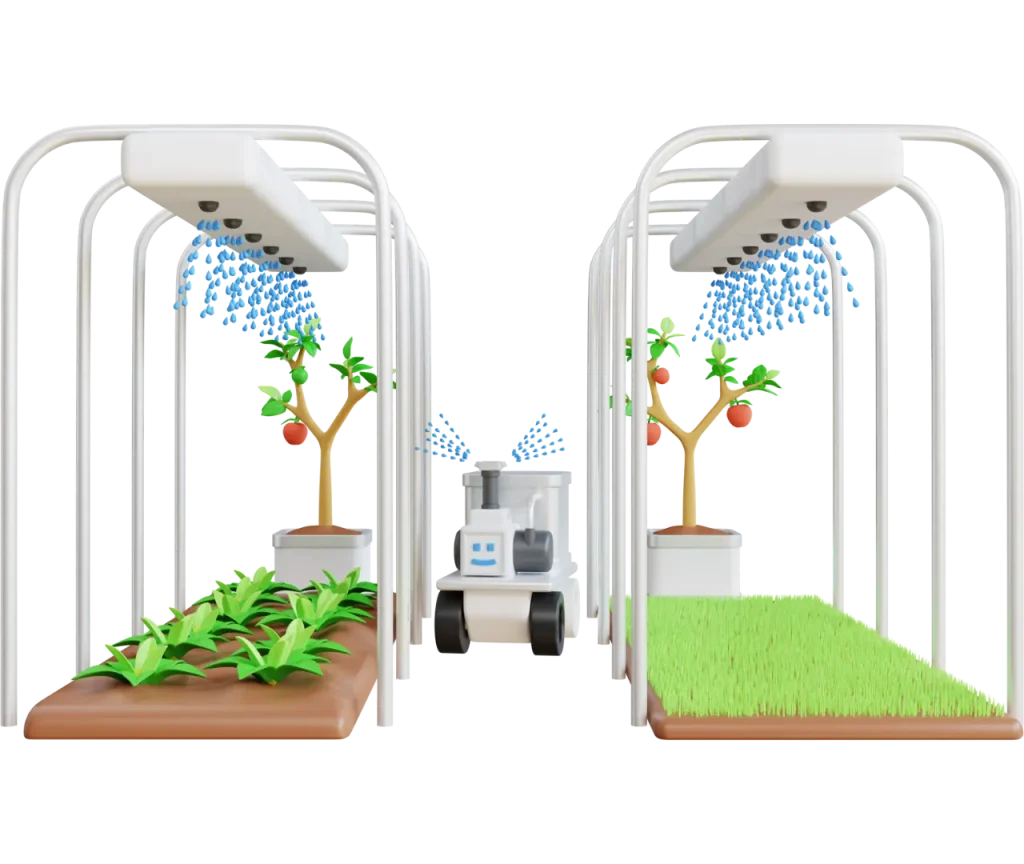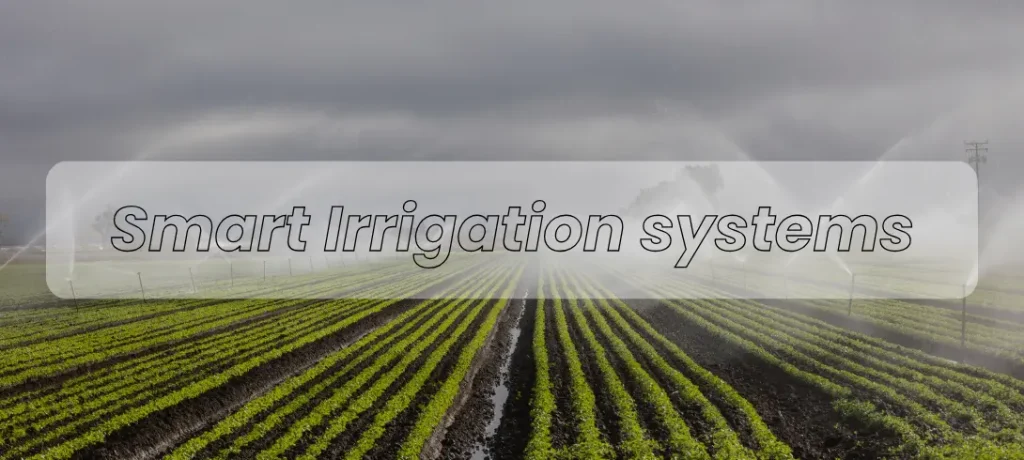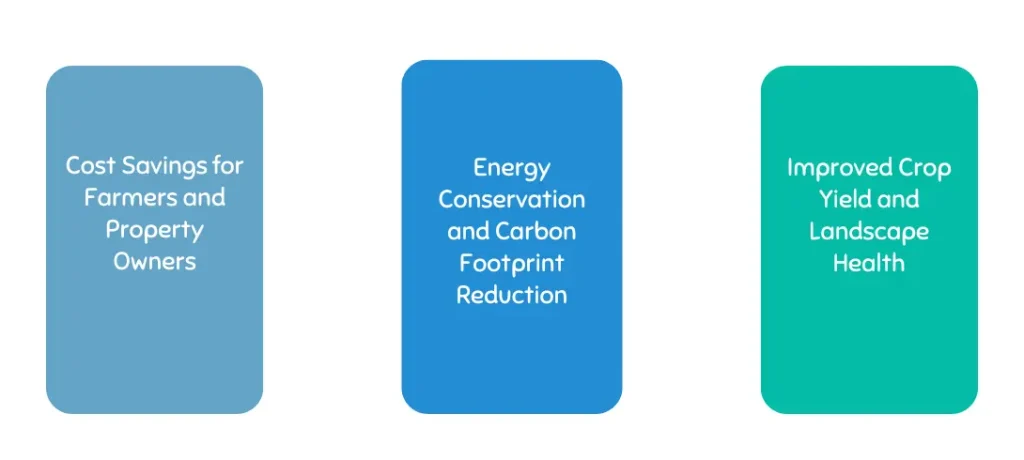The Role of Smart Irrigation Systems in Water Conservation
Water scarcity is one of the most pressing challenges of our time. With climate change intensifying droughts and increasing global temperatures, the demand for effective water management has never been higher. Agriculture alone accounts for nearly 70% of global freshwater withdrawals, yet inefficient irrigation methods lead to massive water wastage. Similarly, urban landscaping, golf courses, and public green spaces often rely on outdated irrigation systems that do not consider real-time environmental factors. This inefficiency calls for a smarter, data-driven approach to irrigation one that minimizes waste while maximizing water efficiency.
Smart Irrigation Systems offer a revolutionary way to manage water more effectively. Unlike traditional irrigation methods, which operate on fixed schedules or manual adjustments, Smart Irrigation Systems use real-time data, automation, and advanced sensors to optimize water distribution. These systems assess soil moisture, weather patterns, plant water needs, and evaporation rates to ensure that irrigation happens only when necessary. By doing so, they prevent overwatering, reduce runoff, and conserve vital water resources while maintaining healthy landscapes and productive agricultural fields.

Understanding Smart Irrigation Systems
Water management is a critical challenge in agriculture, landscaping, and urban development, making irrigation efficiency more important than ever. Traditional irrigation methods often lead to excessive water usage due to fixed schedules or manual adjustments, resulting in water waste, higher costs, and environmental strain. Smart Irrigation Systems provide a modern solution by using advanced technology to optimize water distribution, ensuring that plants receive the right amount of water precisely when they need it. These systems integrate automation, sensors, and real-time data analysis to enhance efficiency, reduce waste, and support sustainable irrigation practices.
What Are Smart Irrigation Systems?
Smart Irrigation Systems are technology-driven irrigation solutions designed to improve water efficiency by automatically adjusting watering schedules based on real-time environmental data. Unlike traditional irrigation, which follows preset routines regardless of weather or soil conditions, these systems analyze various factors such as soil moisture, temperature, humidity, and rainfall to determine the optimal watering needs.
By incorporating automation and data analytics, Smart Irrigation Systems eliminate human error and guesswork, making irrigation more precise. These systems are widely used in agriculture, public parks, golf courses, and residential landscapes, where efficient water management is crucial. Whether managing large farmlands or small garden spaces, Smart Irrigation Systems help conserve water while maintaining healthy plant growth.
Evolution of Irrigation Methods
Historically, irrigation has evolved from basic manual techniques to highly sophisticated automated systems. Early methods, such as flood irrigation and furrow irrigation, relied on channeling water across fields, often leading to excessive runoff and inefficient water use. While these techniques were effective in ensuring crop growth, they wasted significant amounts of water.
The introduction of sprinkler systems and drip irrigation improved efficiency by targeting plant roots more directly. However, these methods still required manual adjustments and lacked adaptability to real-time environmental changes. Over time, advancements in sensor technology, automation, and IoT enabled a shift toward Smart Irrigation Systems. These modern systems now incorporate machine learning and predictive analytics to further optimize water usage, ensuring that irrigation practices align with actual plant needs.
Climate change, increasing water scarcity, and the rising costs of water resources have further accelerated the adoption of Smart Irrigation Systems. As regulatory policies encourage sustainable practices, industries and individuals are moving towards intelligent water management solutions to balance productivity and conservation.
Key Components of Smart Irrigation Systems
Several advanced components work together to make Smart Irrigation Systems highly effective:
Soil Moisture Sensors – These sensors detect the exact moisture levels in the soil, ensuring irrigation occurs only when necessary. By preventing overwatering, they help conserve water while promoting healthier plant growth.
Weather-Based Controllers – These controllers use weather forecasts and real-time climate data to adjust irrigation schedules automatically. If rainfall is predicted, the system reduces or delays watering, preventing unnecessary water usage.
Automated Valves and Drip Systems – Unlike traditional irrigation, which may flood an area indiscriminately, automated valves and precision drip systems deliver water directly to the plant roots. This targeted approach minimizes evaporation and water runoff.
Cloud-Based Monitoring & Remote Access – Many Smart Irrigation Systems are integrated with cloud technology, allowing users to monitor and control irrigation settings remotely via mobile apps or web dashboards. This feature is particularly beneficial for large-scale agricultural operations and urban green spaces.
AI and Machine Learning Integration – Some advanced systems leverage AI to analyze historical data, plant requirements, and environmental patterns. This allows for predictive irrigation scheduling, ensuring optimal water distribution with minimal human intervention.
By integrating these components, Smart Irrigation Systems contribute to water conservation, cost reduction, and improved plant health, making them a vital tool in modern water management strategies.
The Importance of Water Conservation in Agriculture and Landscaping
Water is one of the most precious natural resources, yet its availability is increasingly threatened by overuse, climate change, and population growth. Agriculture, which consumes nearly 70% of the world’s freshwater, is a key sector where water conservation can make a significant impact. Similarly, urban landscaping, public parks, and commercial green spaces rely heavily on irrigation, often leading to excessive water consumption due to inefficient practices.
Conserving water in these areas is crucial not just for maintaining sustainable food production but also for preserving ecosystems, preventing soil degradation, and ensuring a stable water supply for future generations. Smart Irrigation Systems offer a viable solution by optimizing water usage, reducing wastage, and maintaining healthy landscapes without unnecessary resource depletion.

The Growing Water Crisis
The global demand for freshwater is increasing rapidly, yet water availability remains a major concern. Several factors contribute to the escalating water crisis:
- Population Growth and Urban Expansion – As cities expand, the demand for water in residential areas, industrial applications, and irrigation rises, leading to over-extraction of water sources.
- Climate Change Effects – Unpredictable weather patterns, prolonged droughts, and rising temperatures have exacerbated water shortages, making efficient water management more critical.
- Declining Groundwater Levels – Over-extraction of groundwater for irrigation has led to severe depletion, threatening long-term agricultural sustainability.
- Water Pollution – Industrial waste, agricultural runoff, and improper disposal of chemicals have contaminated freshwater sources, reducing the amount of usable water.
Given these challenges, adopting Smart Irrigation Systems is no longer optional—it is essential. By managing water intelligently, these systems help mitigate the effects of water scarcity while ensuring that crops, gardens, and urban landscapes thrive.
How Conventional Irrigation Wastes Water
Traditional irrigation methods, such as flood irrigation, sprinkler systems, and fixed-schedule watering, often lead to inefficient water use. Some of the most common issues include:
- Overwatering and Runoff – Many farmers and landscapers apply excessive water, leading to surface runoff that carries away nutrients and increases water waste.
- Evaporation Losses – Open irrigation systems and overhead sprinklers expose water to sunlight and wind, causing significant evaporation before the water reaches plant roots.
- Lack of Real-Time Adjustments – Conventional systems do not account for weather changes, soil conditions, or plant water needs, often resulting in unnecessary irrigation.
- Soil Erosion and Nutrient Depletion – Overwatering can degrade soil structure, wash away essential minerals, and reduce soil fertility, ultimately affecting plant growth.
Smart Irrigation Systems address these inefficiencies by delivering water only when and where it is needed, using automated sensors and data-driven technology to maximize conservation.
The Role of Technology in Sustainable Water Management
The integration of technology into irrigation has significantly improved water conservation efforts. Some of the most impactful advancements include:
- AI-Powered Smart Irrigation – Artificial intelligence analyzes environmental data to optimize watering schedules and prevent overuse.
- IoT-Based Sensors – Soil moisture and weather sensors provide real-time data, ensuring that irrigation happens only when necessary.
- Automated Irrigation Controllers – These systems adjust water flow based on current soil conditions, humidity levels, and weather forecasts.
- Remote Monitoring and Control – Mobile applications allow users to adjust irrigation schedules remotely, ensuring flexibility and efficiency.
- Government Policies and Incentives – Many governments offer incentives, subsidies, and grants for adopting water-efficient technologies, promoting the widespread implementation of Smart Irrigation Systems.
By leveraging these technological solutions, Smart Irrigation Systems play a vital role in reducing water waste, improving soil health, and promoting sustainable agriculture and urban landscaping. As more industries and municipalities adopt these systems, the collective impact on global water conservation will be profound.
How Smart Irrigation Systems Contribute to Water Conservation
Water conservation is a growing concern worldwide, with traditional irrigation methods often leading to excessive water usage, high costs, and environmental strain. Smart Irrigation Systems address these challenges by optimizing irrigation through real-time monitoring, automated controls, and data-driven decision-making. By ensuring that water is applied precisely where and when it is needed, these systems play a crucial role in sustainable water management across agriculture, landscaping, and urban green spaces.
Precision Watering for Maximum Efficiency
One of the most significant advantages of Smart Irrigation Systems is their ability to provide precision watering, ensuring that plants receive the exact amount of water needed for optimal growth. Unlike conventional irrigation, which often operates on fixed schedules, smart systems adapt based on real-time conditions.
- Eliminating Overwatering and Under-Watering – Traditional methods often result in excessive watering, leading to runoff and wasted resources. Smart irrigation adjusts in real time, preventing unnecessary water usage while ensuring plants receive adequate hydration.
- Targeted Water Delivery – Smart drip irrigation and controlled sprinkler systems deliver water directly to plant roots, minimizing evaporation and runoff. This targeted approach is particularly useful in agriculture, where water efficiency directly impacts crop yields.
- Reducing Runoff and Soil Erosion – Excessive watering can lead to soil erosion and nutrient depletion. Smart systems regulate flow rates to prevent water from pooling or washing away soil nutrients, ensuring sustainable land use.
By automating water distribution and customizing irrigation schedules, Smart Irrigation Systems significantly improve efficiency while reducing environmental impact.

Economic and Environmental Benefits of Smart Irrigation Systems
Smart Irrigation Systems do more than just conserve water; they reduce costs, optimize resource usage, and contribute to a healthier environment. Traditional irrigation methods often lead to water wastage, high operational expenses, and excessive energy consumption, which impact both finances and the environment. By leveraging automation, real-time data, and efficient water distribution, Smart Irrigation Systems provide an effective solution for reducing costs while promoting sustainability.
Cost Savings for Farmers and Property Owners
One of the primary economic benefits of Smart Irrigation Systems is the significant reduction in water bills. Since traditional irrigation systems often operate on fixed schedules without considering weather conditions or soil moisture levels, they overuse water, leading to unnecessary costs. Smart irrigation optimizes water application, ensuring only the required amount is used.
- Lower Water Bills – By reducing excess irrigation, property owners, landscapers, and farmers cut down on water consumption, leading to substantial savings on utility bills.
- Reduced Operational Costs – Smart irrigation minimizes labor costs, as the system automates watering and reduces the need for manual intervention. Additionally, less water usage means lower maintenance costs for irrigation infrastructure.
- Long-Term Investment Benefits – While the initial investment in a Smart Irrigation System may seem high, the return on investment (ROI) is substantial. Over time, savings on water, energy, and labor make the system highly cost-effective.
- Case Study: Financial Impact on Farms and Commercial Properties – Studies have shown that farms using Smart Irrigation Systems have cut water costs by 30-50%, while commercial properties such as golf courses and public parks have reported similar reductions in operational expenses.
The financial savings alone make Smart Irrigation Systems a valuable investment for both small-scale and large-scale irrigation operations.
Energy Conservation and Carbon Footprint Reduction
Beyond financial benefits, Smart Irrigation Systems play a crucial role in energy conservation and carbon footprint reduction. Traditional irrigation requires significant energy for pumping, water distribution, and manual operation, leading to higher electricity or fuel consumption. By optimizing water flow and reducing energy-intensive irrigation activities, Smart Irrigation Systems help lower greenhouse gas emissions.
- Efficient Pumping and Distribution – Since smart systems only activate pumps when necessary, they reduce overall energy consumption in large-scale agricultural and landscaping operations.
- Lower Greenhouse Gas Emissions – Less energy usage translates to a smaller carbon footprint, contributing to global sustainability efforts.
- Sustainable Resource Management – By promoting responsible water use, these systems help conserve energy while reducing the environmental impact of excessive irrigation.
- Impact on Large-Scale Agricultural Operations – In large farming operations, where irrigation consumes massive amounts of water and energy, switching to Smart Irrigation Systems can significantly lower environmental impact while ensuring long-term sustainability.
Smart irrigation aligns with global environmental goals, helping reduce energy dependence, lower carbon emissions, and promote eco-friendly farming and landscaping practices.
Improved Crop Yield and Landscape Health
One of the key benefits of Smart Irrigation Systems is their ability to enhance plant health and crop yield through precision watering. Water stress—either too much or too little water—can severely impact plant growth, leading to lower agricultural productivity and deteriorating landscape conditions.
- Optimized Watering for Better Crop Growth – By delivering the right amount of water at the right time, smart systems help maintain optimal soil moisture, leading to higher crop yields and healthier plants.
- Preventing Soil Degradation and Erosion – Overwatering leads to soil erosion, nutrient loss, and reduced fertility. Smart irrigation prevents excessive runoff and leaching, ensuring that soil quality is preserved.
- Healthier Urban Landscapes – In cities, where green spaces like parks, gardens, and golf courses require constant irrigation, Smart Irrigation Systems ensure lush landscapes without overusing water.
- Long-Term Sustainability Benefits – By preventing soil erosion, waterlogging, and nutrient depletion, these systems contribute to ecosystem stability, supporting biodiversity and sustainable farming practices.
Through precise water management, Smart Irrigation Systems help maximize agricultural output, improve landscape health, and maintain a balanced ecosystem, ensuring long-term sustainability

Challenges and Future Trends in Smart Irrigation
While Smart Irrigation Systems offer numerous advantages in water conservation, cost reduction, and environmental sustainability, their widespread adoption still faces several hurdles. High initial investment costs, technical complexity, and limited awareness make it difficult for many farmers, landscapers, and municipalities to transition from conventional irrigation methods. However, advancements in AI, automation, and predictive analytics are rapidly transforming the sector, making smart irrigation more accessible and efficient. Additionally, government policies and financial incentives are playing a critical role in promoting the adoption of water-efficient irrigation technologies.
Barriers to Adoption
Despite their long-term benefits, Smart Irrigation Systems face several challenges that slow down widespread implementation:
- High Initial Investment – One of the primary obstacles is the cost of smart irrigation technology, including sensors, controllers, and automation systems. While these systems provide long-term savings, the upfront expenses can be prohibitive for small-scale farmers and property owners who operate on limited budgets.
- Technical Complexity – Many farmers and landscapers lack the technical expertise required to install, operate, and maintain smart irrigation systems. Understanding data analytics, automation settings, and integration with weather-based controllers can be overwhelming for those unfamiliar with digital technologies.
- Limited Awareness and Accessibility – In rural areas and developing regions, many farmers are unaware of Smart Irrigation Systems or lack access to the necessary infrastructure. This lack of awareness prevents widespread adoption.
- Connectivity and Power Issues – Smart irrigation often relies on internet connectivity, cloud-based systems, and remote monitoring, which can be challenging in remote agricultural areas where internet and electricity supply are unreliable.
Overcoming these barriers requires education, affordable technology, and government support, ensuring that Smart Irrigation Systems become more accessible to a broader audience.
Technological Innovations in Smart Irrigation Systems
Despite adoption challenges, ongoing advancements in smart irrigation technology are making these systems more intelligent, efficient, and user-friendly. Some of the key innovations shaping the future of irrigation include:
- AI-Driven Automation – Artificial Intelligence (AI) is revolutionizing smart irrigation by analyzing historical and real-time data to optimize watering schedules. These AI-powered systems continuously learn and adapt, making irrigation more precise and efficient over time.
- Predictive Analytics for Water Management – Modern irrigation systems use big data and machine learning algorithms to predict future water needs based on weather patterns, soil conditions, and plant requirements. This prevents overwatering and reduces resource wastage.
- Integration with Smart City Initiatives – Many urban areas are integrating smart irrigation with broader sustainability programs, using real-time environmental data to regulate water usage in parks, green spaces, and public gardens.
- Advanced Sensor Technology – Next-generation soil moisture sensors, weather-based controllers, and IoT-based monitoring systems are becoming more accurate and energy-efficient, allowing for better real-time decision-making in irrigation.
- Solar-Powered Smart Irrigation – To address energy constraints in remote areas, solar-powered irrigation systems are emerging, reducing reliance on grid electricity while ensuring continuous and cost-effective water management.
With these advancements, Smart Irrigation Systems will become more accessible, affordable, and efficient, making them a standard in sustainable water management.
Government Policies and Incentives
Governments worldwide recognize the importance of water conservation and are actively supporting Smart Irrigation Systems through policies, subsidies, and incentives. Some key government-driven initiatives include:
- Regulatory Frameworks for Water Conservation – Many countries are enforcing water management regulations that encourage or mandate the use of smart irrigation technologies in agriculture and urban landscaping.
- Subsidies and Grants for Farmers – Several governments offer financial assistance programs to help farmers and landowners invest in Smart Irrigation Systems. These subsidies reduce the initial cost barrier, making adoption easier.
- Sustainability Goals and Climate Policies – Many national and international organizations are promoting climate-resilient agriculture, where smart irrigation aligns with global sustainability objectives such as reducing water waste, lowering carbon footprints, and improving food security.
- Public-Private Partnerships (PPP) – Governments are collaborating with private technology firms and research institutions to accelerate the development and deployment of cost-effective smart irrigation solutions.
By supporting innovation, providing financial incentives, and raising awareness, policymakers play a critical role in accelerating the transition to water-efficient irrigation systems.
Conclusion: The Role of Smart Irrigation Systems in Water Conservation
Water conservation is a global priority, and Smart Irrigation Systems play a crucial role in ensuring sustainable and efficient water management. By integrating automation, real-time data monitoring, and AI-driven decision-making, these systems significantly reduce water wastage while optimizing plant hydration. Whether in agriculture, landscaping, or urban green spaces, Smart Irrigation Systems enhance productivity, lower costs, and support environmental sustainability.
As climate change intensifies and water scarcity becomes a growing challenge, the adoption of Smart Irrigation Systems will be vital in preserving freshwater resources. The combination of weather-based controllers, soil moisture sensors, and cloud-based automation ensures that water is used efficiently and responsibly. Additionally, the reduction in energy consumption and greenhouse gas emissions makes these systems an essential component of eco-friendly irrigation practices.
Looking ahead, technological advancements in AI, predictive analytics, and IoT connectivity will further refine irrigation strategies, making water management even more precise and accessible. With strong government policies, financial incentives, and greater awareness, the widespread adoption of Smart Irrigation Systems will help build a water-efficient and sustainable future. As industries, municipalities, and farmers continue to embrace these innovations, Smart Irrigation Systems will become a standard for responsible water usage worldwide.










